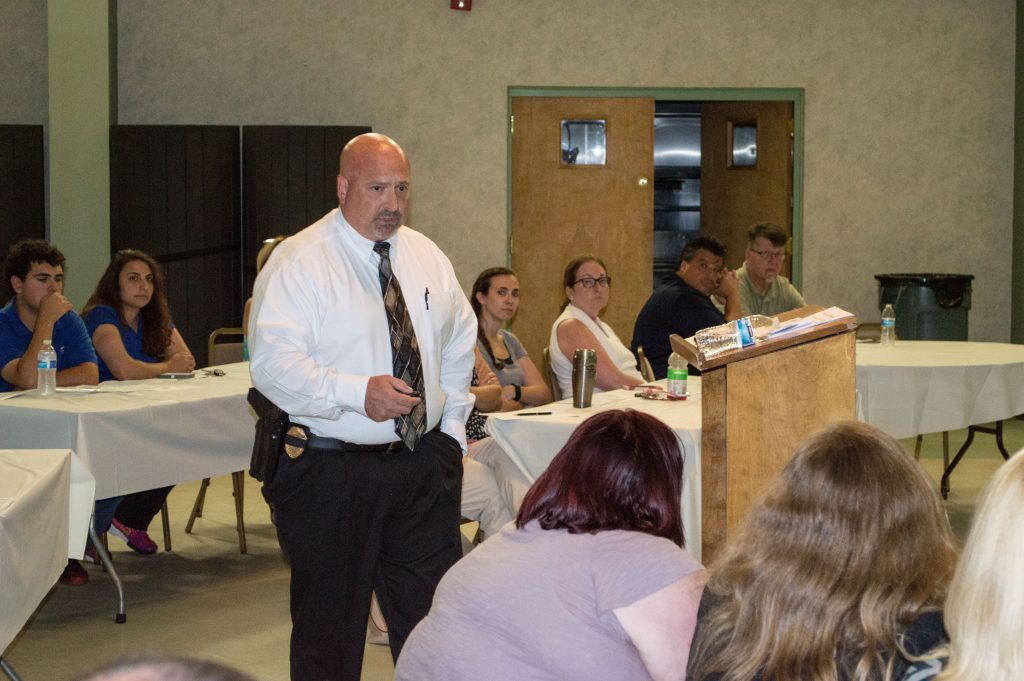
Brick Police Detective Tim McCarthy addresses business owners on active shooter preparation. (Photo: Daniel Nee)
With the primary national terrorism threat having evolved from grand-scale attacks, such as those on Sept. 11, 2001, to “lone wolf” mayhem such as the deadly shooting at a nightclub in Orlando, local places of business have become the new venues for perpetrators.
Long before the era of ISIS, Brick had its first taste of an active shooter scenario. In March 1987, Luis Rosa took a township police officer’s gun and drove to the Dee Rose furniture store on Brick Boulevard, where he shot two people – his girlfriend and her new boyfriend – before killing himself. The man who was shot, John Brinker, a salesman at the store, died.
“The attacks on the general public and the business community are becoming way too common,” said Brick Police Detective Tim McCarthy, who led a presentation Wednesday night on how business owners can prepare for such an incident. “We train the schools to protect children, but in the business community, it’s up to the business owner how to protect themselves, their customers and their employees.”
|
|
McCarthy, an 18-year veteran of the department, leads the agency’s counter-terrorism efforts. He has also taken the lead in training the township’s schools on how to handle an active shooter crisis. In light of the recent attack on the Pulse nightclub in Orlando, as well as the terrorism-linked shooting in San Bernadino, Calif. earlier this week, the focus has evolved to cover places of business.
“We have a lot of these lone wolf offenders, and they’re a little bit harder to find,” said McCarthy. “They live in the shadows.”
Recent events – especially those involving the so-called “lone wolves” – show that mass shootings can occur anywhere, even a location such as Brick that is relatively removed from cities such as Philadelphia and New York.
“It’s not just the big cities where we have these incidents,” said Chief James Riccio. “If you look at what’s been in the news, it’s a lot of the small towns that are seeing these scenarios.”
Wednesday night’s presentation was sponsored by the township’s Chamber of Commerce, which invited business owners to the Brick PAL building for the free, hour-long program. McCarthy, drawing on countless hours of homeland security and counter-terrorism training, gave some pointers.
“Most of the incidents end in five minutes, and some end within two minutes,” McCarthy said, emphasizing that shooters rarely plan out their attacks beyond the simple act of brandishing a weapon and firing. To that end, a prepared civilian can play a role in saving lives or disrupting the perpetrator’s plan.
“Civilians often have to make life and death decisions, so therefore, they should be involved in training and discussions on decisions they may face,” McCarthy added.
Workers and customers in businesses should first be aware of their surroundings by taking a glance at potential exits or even large objects which could be used to hide in the event of an emergency, or a shield in case bullets begin to fly. Experts say civilians should take three steps in the event of an active shooting incident: escape, hide or fight.
“Always try to escape or evacuate first,” said McCarthy.
If there is no way out of the building, hide, he said. Try to secure a hiding place as fast as possible. Silence cell phones, turn off lights. Conceal yourself behind large objects that may protect you if shots are fired in your direction.
If there is no way to escape and nowhere to hide, a civilian may find that he or she will have to active fight off the shooter. A last resort, fighting can come at a steep price, and should be acted on in a smart manner.
Act with aggression and improvise weapons, said McCarthy.
“Commit to taking the shooter down no matter what,” he said. “That is where we have a lot of our issues. You have to make that determination as to whether you can actually do it.”
Civilians should also understand police procedures during such an attack. McCarthy said the first group of responders to enter a building will not stop to render aid to the wounded. Their aim, he said, is to stop the shooter before he has the opportunity to injure anyone else.
“The second wave of responders will take care of the injured, so help is on the way,” said McCarthy.
Business owners were urged to come up with an emergency plan so staff members and customers can escape as easily as possible. But despite some general tips, each scenario is unique.
“We can’t tell you exactly what to do,” McCarthy said. “Each business is built differently.”
McCarthy said the Brick police department will happily work with business owners to come up with an emergency plan for their physical location and give some specialized advice and ideas on how to deal with an active shooter. Interested businesses should contact the department to schedule an appointment.

Advertisement

Police, Fire & Courts
Former Ocean County Teacher Sentenced to Parole for Relationship With Student










